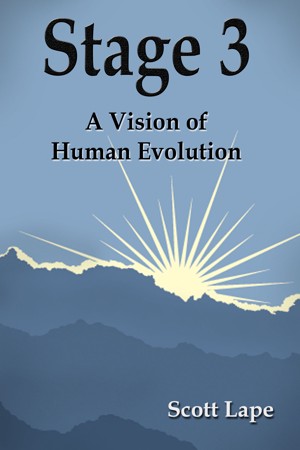Location: United States
Member Since:
Feb. 27, 2013
Scott Lape
Biography
Scott Lape is a writer and singer-songwriter. He lives in Chico, California with his wife and daughter.
Where to find Scott Lape online
Books
Stage 3: A Vision of Human Evolution
by Scott Lape
Price:
$5.00 USD.
Words: 42,130.
Language:
English.
Published: July 15, 2013
.
Categories:
Nonfiction » Philosophy » Contemporary philosophy, Nonfiction » Philosophy » Mind & Body
(4.00 from 1 review)
Is there hope for the human race? This book answers that question with a resounding "Yes!" The author presents a model of consciousness evolution in three stages, and applies the model to explore psychological and spiritual growth both in individual persons and in society as a whole. The book culminates in a hopeful vision of a world of peace and plenty for all.
Scott Lape's tag cloud
Smashwords book reviews by Scott Lape
-
Our Experience, Ourselves
on Aug. 06, 2013
In Our Experience, Ourselves, Lyn Relph explores one of the central questions about human knowledge, which he describes as follows: “To what extent can we let experience be our guide through this world, even if that means ignoring or defying outside sources of authority commanding us to hear and obey?” In considering this question, Relph makes a grand tour of Western thought, starting with the ancient Greeks and Romans, continuing on through the Middle Ages and the Renaissance, taking us all the way to the present day. He draws from a great variety of primary sources, from the writings of ancients like Democritus, Plato, Homer, and St. Paul, to Ibn Tufayl, Boccaccio, and Chaucer in the Middle Ages, onward to Cervantes, Montaigne, Bacon, Swift, and many others. The central theme of man’s relationship to his experience is pursued across many cultures and historical times, and the overall effect is to give the reader a broad and inspiring view of the sweep of the history of thought. This is anything but dry history; instead, the book is a very enjoyable read. The tone is conversational, and Relph includes many amusing anecdotes and fascinating historical details. On every page the reader learns something new, whether the story of how Mondino, da Vinci, and Vesalius developed our understanding of human anatomy, or the story of Harriet Martineau, a celebrated English writer of the nineteenth century who is often called the first female sociologist. Any reader with an active curiosity will find hundreds of gems in these pages. Hats off to Lyn Relph, who has demonstrated the value of his personal experience as a professor of literature by writing this book, which is certain to inform and entertain any discriminating reader.

